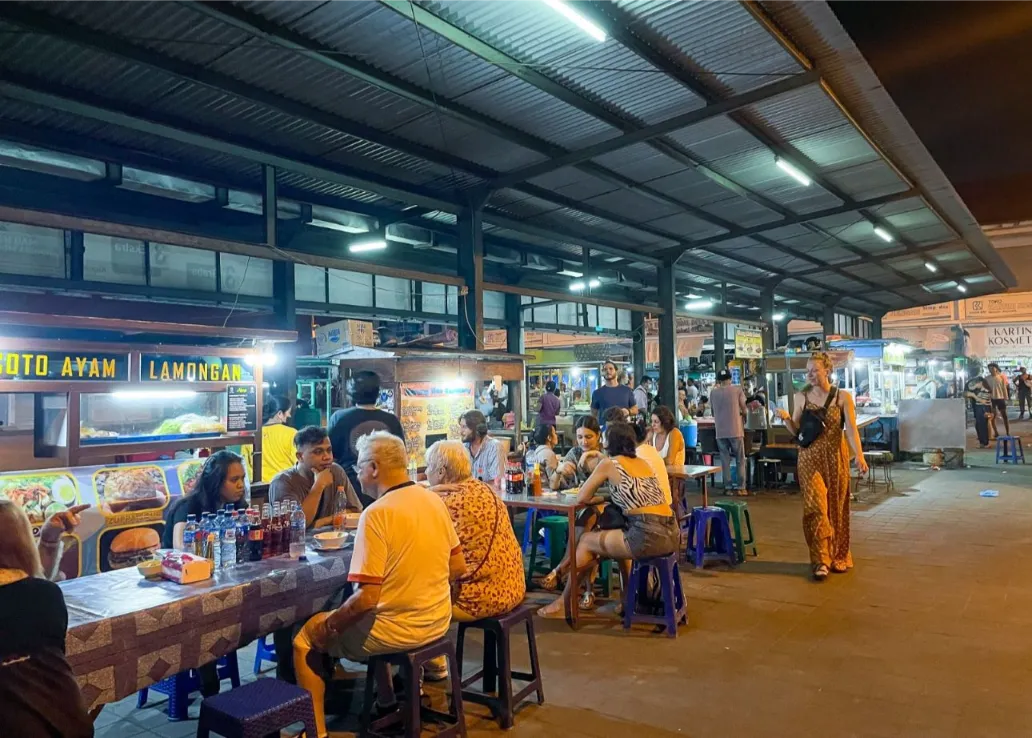Visiting a traditional market is one of the most authentic ways to experience local culture. For foreigners, skipping these vibrant hubs means missing out on the authentic flavors, crafts, and traditions that modern malls simply can’t replicate. From historic landmarks to bustling floating bazaars, Indonesia’s markets offer a sensory journey that weaves together heritage, community, and daily life. Here are eight remarkable traditional markets across the archipelago that every visitor should experience.
- Pasar Santa, Jakarta
Established in 1971, Pasar Santa has transformed from a typical market into a trendy cultural hub in South Jakarta. With its curated thrift stores, unique art stalls, cozy bookshops, and vibrant food vendors, Pasar Santa is especially popular among younger crowds and night owls. Its upper floors offer a treasure trove of aesthetic finds, making it a great spot for photos and evening hangouts.
- Pasar Johar, Semarang
Built in 1936, Pasar Johar was once the largest and most modern market in Southeast Asia. After a devastating fire in 2015, the market underwent a major revitalization and reopened in 2019. Today, it’s divided into three main sections—North, Central, and South—hosting hundreds of stalls selling everything from daily goods to specialty items. It remains a key commercial and cultural landmark in Central Java.
- Pasar Beringharjo, Yogyakarta
Located on Jalan Pabringan, Pasar Beringharjo has been a bustling trade center since 1758 and is still one of Indonesia’s most iconic markets. Here, visitors can shop for batik, antiques, herbs, and street food. Don’t miss the famous sate gajih, a rare traditional skewer dish that dates back to colonial times.
- Pasar Gede, Solo
Steeped in history, Pasar Gede was built in 1927 during the reign of Pakubuwono X. With its colonial-era architecture and lively atmosphere, it continues to be the heart of Solo’s culinary and shopping scene. Visitors often flock here for local delicacies and traditional snacks unique to the region.
- Pasar Oro-Oro Dowo, Malang
Built in 1932 during the Dutch colonial period, this market is known for its cleanliness, organization, and wide selection of food. Revitalized in 2015, it houses around 180 vendors selling fresh produce, prepared meals, and snacks. It’s a cozy yet vibrant stop for those exploring Malang.
- Pasar Sindhu, Sanur, Bali
Besides the famous Sukowati Market, Sindhu Market in Sanur is another top spot for expats and tourists in Bali. Located on Jalan Pungutan No. 2, this lively market is especially popular for its attractive night market scene. By 6 p.m., food stalls and carts line the street, serving local favorites like lamb satay, bakso (meatball soup), and nasi goreng at budget-friendly prices—making it a must-visit for a flavorful evening out. With its welcoming atmosphere and authentic flavors, Sindhu Market offers a perfect blend of local culture and everyday convenience.
- Muara Kuin Floating Market, Banjarmasin
One of Indonesia’s most unique markets floats on the Kuin River. Every morning, traders in traditional jukung boats sell vegetables, fruits, meat, and snacks directly from the water. This lively floating market attracts both domestic and international tourists eager to witness traditional river trade.
- Al Mahirah People’s Market, Banda Aceh
Located in Lamdingin village, this market opened in 2020 as part of a coastal economic development project. With over 500 stalls, it has become a new shopping hub while continuing the legacy of the old Peunayong market.
A Journey Through Culture and Commerce
Exploring Indonesia’s traditional markets is more than just shopping—it’s about connecting with local history, flavors, and people. Whether you’re an expat looking for hidden gems or a tourist seeking authentic experiences, these markets promise unforgettable memories and a deeper understanding of Indonesia’s vibrant heritage.
Source: NgopiBareng, CNBC, Inilah, Antara, Kumparan, Detik
Photo Credit: Denpasar Tourism


